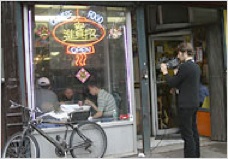June 5, 2008
Film Spotlights City Life Often Overlooked
By JENNIFER 8. LEE
June 5, 2008
Film Spotlights City Life Often Overlooked
By JENNIFER 8. LEE


That audience member has not been the only one who was confused. “A lot of people say to us, ‘Congratulations on your documentary!’ ” Mr. Baker said. “Some people will just naturally assume that the film is a documentary because of the subject matter, because who would make a narrative film about it?”
Arguably no other American city has such an intimate relationship with deliverymen as New York does. After all, the delivery phenomenon (along with the ensuing menu wars) took off on the Upper West Side in the late 1970s, led by a restaurant not too far from where the movie was shot: Empire Szechuan, at 97th and Broadway, which closed a year and a half ago.
Yet the confusion is validating to Mr. Baker and his co-director, Shih-Ching Tsou, in their vision of the film as a grounds-eye, realistic portrayal of their adopted city. “To us, it makes us feel like it accomplished our goal,” Mr. Baker said. “We were heavily influence by cinéma vérité.”
Of course, the vérité effect was driven as much by scarcity of resources as by an artistic aesthetic. In a way, nothing is cheaper than reality.
The movie — put together with a $3,000 budget and a lot of personal favors — was filmed in a real Chinese takeout restaurant at 103rd Street and Amsterdam Avenue during working hours. “We had to work through whenever they had five minutes, one minute, whenever they had a break,” Ms. Tsou said.
To ease the transitions, the actors wore clothes similar to those of the actual workers, many of whom, like the fictional delivery man, were illegally smuggled into the United States. A lot of the cooking and food preparation scenes in the film are real.
The filming was done with a discreet handheld digital camera similar to those sometimes used in documentary filmmaking, and the entire restaurant was outfitted with microphones. As a result, some of the “customers” in “Take Out” are actual patrons of the restaurant, who were asked to sign releases afterward. And one of the leads in the film, Big Sister, is the woman who actually worked in the restaurant answering the phones, Wang-Thye Lee.
“After one month of preproduction, we fell in love with her,” Ms. Tsou said. “We asked her to act in the film.” Other New Yorkers had cameos, too. Most of the delivery customers — characters with names like No Speakee English and Mail Order Faster in the credits — were drawn from a very democratic source: Craigslist.
The directors asked for volunteers who would be willing to share a shot of their door and 20 to 30 minutes of their time. The promised payment: $5 and a DVD of the film. They had 50 responses.
Some 20 deliveries, representing a wide socioeconomic spectrum, appear in the movie, many of them improvised, including a scene where a couple fight about the fact that the man is ordering takeout while the woman wants to go out to eat.
The movie trails the deliveryman throughout a single day — think of it as the General Tso’s Chicken meets “24” — which gives a drumbeat of repetitiveness.
“We wanted to get the audience to be hypnotized by the monotony of what is going on,” Mr. Baker said.
The “deliveryman,” it turns out, is doing fine. He works in the marketing division at Google and is getting his M.B.A. part time. He is a Korean-American actor named Charles Jang who speaks fluent Mandarin from a year of study in Taiwan.
His Chinese is so good, despite a slight accent, that during his audition Ms. Tsou, who is from Taiwan, struggled to place what part of China Mr. Jang was from. (Mr. Jang was raised mostly in Great Neck.)
Mr. Baker’s next film is called “Prince of Broadway,” about an African immigrant street vendor. “We are trying to do films on people who are ignored or taken for granted by a large part of society,” he said.
Indeed, Chinese restaurant workers often float through American society without leaving tracks. This is true even for one of the film’s stars. The restaurant where “Take Out” was shot has closed, and the directors have lost track of Ms. Lee.
“I wish we could find her,” Mr. Baker said. “She’s getting such great reviews.”
The directors of “Take Out,” a feature film about a Chinese deliveryman who must pay off his debt to immigrant-smugglers, do not claim that their movie is based on a true story. But it has more than a passing resemblance to a documentary, so much so that after a screening, one of the audience members asked where the man was now, and whether he was doing all right.
“We couldn’t stop laughing,” said Sean Baker, one of the co-directors of the film, which opens at Quad Cinema in Chelsea on Friday.